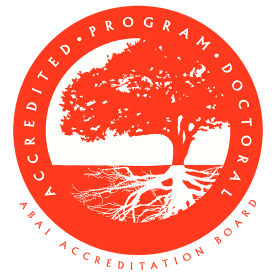Ph.D. in Special Education: Applied Behavior Analysis
The Teaching as Applied Behavior Analysis Ph.D. incorporates an approach to teacher training in which all instruction used by teachers is based on scientific evidence and the use of scientific procedures to fit the appropriate science-based practices to individual students’ varied learning and language developmental needs.
Research is a central component of the training—both the applications of research using science based tactics and measurement, and the generation of new research. The focus of the MA program is in the application of scientific procedures in classrooms, while Ph.D. students engage in research throughout their program, building on their research training in the MA, culminating in a dissertation that identifies and investigates a topic related to our mission.
Dissertations must make contributions to both the applied and basic science. The faculty and the students generate a substantial body of research leading to publications and presentations at international scientific conferences each year and this is a key component of the Ph.D. training. Programmatic research is conducted in the following areas: effective classroom practices, language/verbal development interventions that result in children learning to learn in different ways, observational learning, and systems wide scientific approaches to education.
Students who already hold M.A. Degrees from other institutions must take the twelve M.A. core courses because the core prepares them with the means to be successful in completing milestone Ph.D. requirements. Ph.D. students also need to be dually certified in New York State for teaching children from birth to grade 6.


Admission Information
Displaying requirements for the Spring 2025, Summer 2025, and Fall 2025 terms.
Doctor of Philosophy
- Points/Credits: 75
- Entry Terms: Summer, Fall
- Enrollment Formats: Full-Time Campus-Based
Application Deadlines
| Entry Term Available | Priority Deadlines | Final Deadlines | Extended Deadlines |
|---|---|---|---|
| Spring | N/A | N/A | N/A |
| Summer | December 1, 2024 | June 1, 2025 | N/A |
| Fall | December 1, 2024 | July 1, 2025 | N/A |
Select programs remain open beyond our standard application deadlines, such as those with an extended deadline or those that are rolling (open until June or July). If your program is rolling or has an extended deadline indicated above, applications are reviewed as they are received and on a space-available basis. We recommend you complete your application as soon as possible as these programs can close earlier if full capacity has been met.
Application Requirements
| Requirement | |
|---|---|
| Online Degree Application, including Statement of Purpose and Resume | |
| Transcripts and/or Course-by-Course Evaluations for all Undergraduate/Graduate Coursework Completed | |
| Results from an accepted English Proficiency Exam (if applicable) | |
| $75 Application Fee | |
| Two (2) Letters of Recommendation | |
| Master's degree required | |
| Academic Writing Sample | |
| Must hold Master's degree in Applied Behavior Analysis from a CABAS-affiliated university |
For admission-related inquiries, please contact HAEPadmission@tc.columbia.edu.
Requirements from the TC Catalog (AY 2024-2025)
Displaying catalog information for the Fall 2024, Spring 2025 and Summer 2025 terms.
Research and Evaluation Emphasis:
Students with excellent potential as researchers and theoreticians who are interested in scholarly careers in special education, education, and related social sciences may apply for the Ph.D. degree program, which represents the highest level of achievement in the Arts and Sciences. This degree program is administered jointly by Teachers College and the graduate faculty of Columbia University.
Prospective students may obtain information on program offerings by contacting the program office.
Ph.D. in Special Education: Applied Behavior Analysis
The Teaching as Applied Behavior Analysis M.A. and Ph.D. programs incorporate an approach to teacher training in which all instruction used by teachers is based on scientific evidence and the use of scientific procedures to fit the appropriate science-based practices to individual students’ varied learning and language developmental needs. Students accepted into the program are placed in paid teacher assistant positions (M.A. students and Ph.D. students taking the M.A. core) or paid teacher positions (Ph.D. students who have completed at least 3 semesters of the M.A. core) in schools and classrooms that practice teaching as applied behavior analysis. The training of teachers is also based on scientifically tested procedures. Teacher trainees are taught until they master the science and its application with all children from 2 years through grade 6.
Research is a central component of the training—both the applications of research using science-based tactics and measurement, and the generation of new research. Ph.D. students engage in research throughout their program, building on their research training in the M.A. and culminating in a dissertation that identifies and investigates a topic related to our mission. Dissertations must make contributions to both applied, and basic science. The faculty and the students generate a substantial body of research leading to publications and presentations at international scientific conferences each year, and this is a key component of the Ph.D. training. Programmatic research is conducted in the following areas: effective classroom practices, language/verbal development interventions that result in children learning to learn in different ways, observational learning, and systems-wide scientific approaches to education.
Students who already hold M.A. degrees from other institutions must take the ten M.A. core courses, because the core prepares them with the means to be successful in completing milestone Ph.D. requirements. Ph.D. students also need to be dually certified in New York State for teaching children from birth to grade 2, and grades 1-6. The teaching placement is a critical part of the program, because it provides the opportunities to train M.A. students and to be involved in cutting-edge research. In that role Ph.D. students are critical instructors for the first- and second year M.A. students, an experience that prepares the doctoral candidate to teach and mentor graduate-level students. Our Ph.D. candidate teachers play a significant role in our record of providing measurably superior instruction and bridging the educational gap.
Program objectives:
-
Use single-subject and group-design research to evaluate all aspects of an educational system, including educational interventions for children, staff and parent training, and teacher training.
-
Train and supervise classrooms and schools such that children are well-behaved and motivated to learn, using positive and non-coercive practices.
-
Master the existing science of learning as applied to the varied needs of children, master teaching others to implement the science of learning independently, and empirically evaluate the effects of such training.
-
Master protocols to identify and induce missing language developmental cusps and capabilities, and master teaching of others to implement these protocols and empirically evaluate the effects of protocols and a child’s development.
-
Master how to use key educational standards and how to match existing tested curricula and tested teaching practices to categories of students and individual students, and master how to teach others to implement these competencies and empirically evaluate the effects of such training.
-
Teach others how to measure all students’ progress continuously and directly in achieving standards and new developmental stages and empirically evaluate such training.
-
Empirically evaluate teaching practices when initial best practices are not successful with children.
-
Teach others to scientifically analyze the source of student learning problems and empirically evaluate such training.
-
Draw on evidence from behavior analysis, cognitive learning, developmental research, special education research, reading/writing literacy research and implement procedures in accordance with Applied Behavior Analysis and teaching as a science.
-
Teach others to teach children to be self-learners and empirically evaluate such interventions.
-
Design functional curricula building on the theory and science of verbal behavior, radical behaviorism, and the foundations of pragmatism. Teach others to design functional curricula and empirically examine the effectiveness of functional curricula.
Department Courses Required for All Student Majors in Degree Program Core Requirements for all Ph.D. Majors in the Applied Sciences of Learning and Special Education Cluster
-
HBSE 5010 Study of the philosophic foundations of special education
-
HBSE 6001 Research in special education: Research/experimental design
-
HBSE 6010 Advanced study of problems and issues in special education
-
HBSE 603105 Research in special education: Single-case design
-
HBSE 7500 Dissertation seminar in special education
-
HBSE 8900-8910 Dissertation advisement in special education
Non-Department Courses Required for All Student Majors in Degree Program
-
HUDM 4122 Probability and statistical inference
-
HUDM 5122 Applied regression analysis
Specialization Requirements, Applied Behavior Analysis:
-
HBSE 5304 Advanced practica in special education: Behavioral disorders
-
HBSE 6404 Advanced internship: Behavior disorders
-
HBSE 5904 Problems in special education: Behavioral disorders (supervision)
-
HBSE 6008 Behaviorism
-
HBSE 6015 The verbal behavior model: Individual educational programming
-
HBSE 6504 Advanced seminar in special education: Applied behavior analysis and behavioral disorders